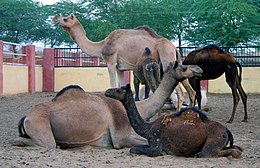National Research Centre on Camels, Bikaner
This article has multiple issues. Please help improve it or discuss these issues on the talk page. (Learn how and when to remove these template messages)
|
National Research Centre on Camel was established in 1984 by the Central Government under Indian Council of Agricultural Research at the outskirts of Bikaner city to promote research and development on camels.[1] It is located about 8 km from Bikaner city in the state of Rajasthan in India.
Progress[edit]
The key objectives of NRCC are camel breeding and health, utilisation of camel milk[2] and its byproducts like ice-cream made of it, which makes it a one-of-a-kind institute in India.[3] The farm is a complex of camel stables, enclosures, and buildings.
Scientists engage with all stakeholders like camel herders, traders via collaborative programmes[4] for development of camels.
Significant growth had been made on opportunities of camel milk trade in India as a functional food because of its therapeutic health benefits,[5] models of successful camel dairying on cooperative basis,[6] Camel usage by BSF India as this species is found mainly in Rajasthan and Gujarat.[7] Camels have greatly caught the attention of tourists from India and abroad.
In popular culture[edit]
Camels are fondly called the "Ships of the Desert" because of their utility in arid climate. They can live without water for many days. They provide alternative means of goods transportation in many districts of Rajasthan, which, in turn, saves fuel and also provides livelihood to many camel herders. The Thar Desert is filled with glorious palaces, natural marvels and, of course, camels which adds to the tourism sector.[8]
Maharaja Ganga Singh of the Bikaner, Rajasthan, India founded Bikaner Camel Corps around 1890 and it participated in World Wars I and II.[9] Because of their long natural history, camels have been declared the state animal of Rajasthan and some communities like Raika are specific in keeping and raising them.[10][11]
Tourists visiting NRCC and& Bikaner enjoy seeing camel calves gamboling around one another during afternoon hours, or camels gathering in sand dunes during sunset. A camel museum is available to apprise them of the developmental and research aspects of the camel in the desert ecosystem. Facilities available are camel riding, desert safari, camel milk and ice cream (locally known as kulfi),[12] souvenir shops selling various decorative items like bags, purses, artwork, shawl, small chains, etc.[13]
International Camel Festival is organised in Bikaner,[14] every year around 12–13 January. The shows include camel dance, camel race, artwork on various breeds of camels, traditional folk dances by locals.[15]
References[edit]
- ↑ "ICAR-NRCC celebrated its 34th Foundation day". Indian Council of Agricultural Research. Retrieved 28 December 2018.
- ↑ "Benefits of drinking Camel Milk". New Delhi Times. 11 February 2017. Retrieved 29 December 2018.
- ↑ "Camel milk, the new Superfood ?". The Times of India. 25 July 2014. Retrieved 28 December 2018.
- ↑ "Village women trek to urban areas to sell camel milk". The Express Tribune. 20 December 2018. Retrieved 29 December 2018.
- ↑ "Camel milk is full of nutrients and it's growing in popularity". Washington Post. 13 June 2018. Retrieved 29 December 2018.
- ↑ "Camel milk is gaining popularity. Could it be an alternative for dairy market?". The Financial Express. 11 November 2018. Retrieved 29 December 2018.
- ↑ "National Research Center on Equines". ICAR-NRCE. Retrieved 28 December 2018.
- ↑ "eRajasthan Tourism". eRajasthan Tourism. Retrieved 28 December 2018.
- ↑ "Camel Ganga Risala of Bikaner". www.lonelyplanet.com. Retrieved 28 December 2018.
- ↑ "Rajasthan's nomadic tribe staring at bleak future after CM declares camel state animal". The Times of India. 11 November 2018. Retrieved 29 December 2018.
- ↑ Chapman, Roger (18 June 2018). "Tracks in the Sand". Pacific Standard. Retrieved 28 December 2018.
- ↑ "Can Camel Milk Save India's Nomadic Raikas?". National Geographic News. 26 October 2016. Retrieved 29 December 2018.
- ↑ "'Tourist hut' launched to promote tourism and Camel Husbandry products". krishijagran.com. Retrieved 29 December 2018.
- ↑ "International camel festival in Bikaner from January 12". The New Indian Express. 27 December 2018. Retrieved 29 December 2018.
- ↑ "Travelling in Rajasthan? Don't miss the Bikaner Camel Festival". Hindustan Times. 14 January 2018. Retrieved 29 December 2018.
